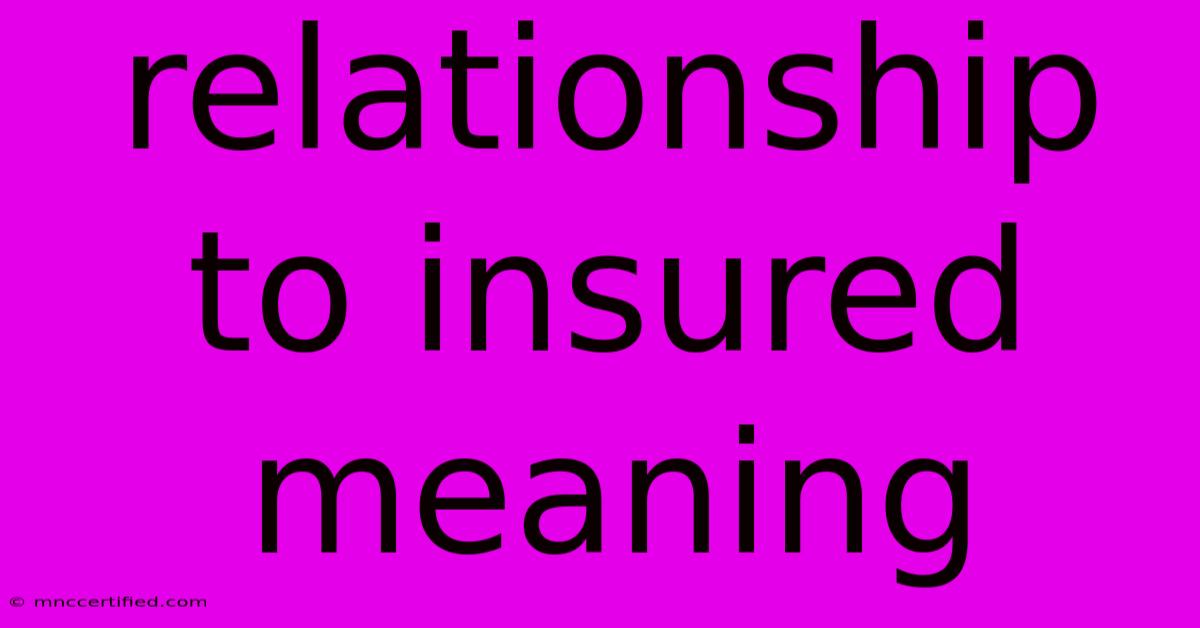Relationship To Insured Meaning

Table of Contents
Relationship to Insured Meaning: A Comprehensive Guide
Understanding your "relationship to the insured" is crucial when dealing with insurance claims. This seemingly simple phrase holds significant weight in determining eligibility for benefits and the extent of coverage. This comprehensive guide will unravel the intricacies of this concept, clarifying its meaning and implications in various insurance contexts.
What Does "Relationship to the Insured" Mean?
In the insurance world, "relationship to the insured" refers to your connection to the person who holds the insurance policy. This connection dictates whether you're entitled to benefits under their policy. It's not simply a matter of knowing the insured; it involves a legally defined relationship that impacts your claim's viability.
The specific definition varies depending on the type of insurance:
Health Insurance:
For health insurance, the relationship often defines who can be covered under a policyholder's plan. This typically includes:
- Spouse: Legally married spouses are usually covered.
- Domestic Partner: Coverage may extend to domestic partners, depending on the insurer and the state's laws.
- Children: Dependent children, up to a certain age, are generally covered. The definition of "dependent child" varies by policy and may include biological, adopted, or stepchildren.
- Parents: In some cases, parents may be covered, especially if they are dependents of the policyholder.
Life Insurance:
In life insurance, the relationship to the insured determines who can receive the death benefit. This is usually specified as a beneficiary, which could be:
- Spouse: A common and primary beneficiary.
- Children: Children are frequently listed as beneficiaries.
- Parents: Parents can also be named as beneficiaries.
- Other Relatives: Siblings, other family members, or friends can be named as beneficiaries.
- Estate: The death benefit can be paid to the insured's estate.
Auto Insurance:
With auto insurance, your relationship to the insured might affect your ability to use their coverage. For example:
- Family Members: Family members living in the household might be covered under the policyholder's liability insurance if they operate the insured vehicle.
- Other Drivers: If you're involved in an accident while driving the insured's car without permission, coverage might be limited or nonexistent.
Why is Understanding Your Relationship to the Insured Important?
Understanding your relationship to the insured is paramount because it directly influences:
- Claim Eligibility: You must have a valid relationship to the insured to file a claim under their policy.
- Benefit Amount: The type of relationship can impact the amount of benefits you receive.
- Claim Processing Speed: Clearly establishing your relationship streamlines the claims process.
- Legal Compliance: Incorrectly stating your relationship can lead to claim denial or legal issues.
How to Prove Your Relationship to the Insured
To successfully prove your relationship to the insured, you’ll generally need to provide documentation such as:
- Marriage Certificate: For spouses.
- Birth Certificates: For children.
- Adoption Papers: For adopted children.
- Legal Documents: For domestic partners.
- Proof of Dependency: Documentation showing financial dependence.
Always refer to the specific policy details for the exact requirements.
Common Misconceptions about Relationship to the Insured
It's vital to dispel common misconceptions:
- "Close Friend" isn't sufficient: Casual relationships usually don't grant access to benefits.
- Cohabitation doesn't automatically qualify: Unmarried partners might need specific legal documentation.
- Policy wording is key: Always read the fine print of the insurance policy for precise details.
Conclusion: Navigating the Nuances of Insurance Relationships
Defining your "relationship to the insured" is a crucial aspect of insurance claims. Understanding its specific meaning within the context of the particular insurance type and having proper documentation ready will ensure a smoother claims process. If you have any questions or ambiguities, always consult the insurance provider directly for clarification. Don't hesitate to seek legal advice if complexities arise. By understanding these nuances, you can protect your rights and access the benefits you're entitled to.

Thank you for visiting our website wich cover about Relationship To Insured Meaning. We hope the information provided has been useful to you. Feel free to contact us if you have any questions or need further assistance. See you next time and dont miss to bookmark.
Featured Posts
-
Investment Gifts For Young Adults
Nov 23, 2024
-
Social Media Outing Khalids Announcement
Nov 23, 2024
-
Lacey Turner Pregnant East Enders Stars News
Nov 23, 2024
-
Deeney On Chelsea Star Last Chance Saloon
Nov 23, 2024
-
Excess Flood Insurance Coverage
Nov 23, 2024